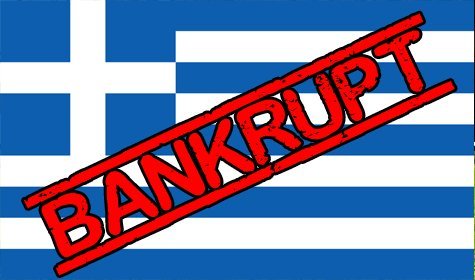The default countdown is about to go under 10 days and it is becoming increasingly apparent that both Greece and its creditors have had enough.
Months of tense negotiations have gone nowhere and yielded exactly nothing and it now looks like PM Alexis Tsipras and FinMin Yanis Varoufakis may be willing to miss a June 5 payment to the IMF if it means proving they are serious about keeping their campaign promises and forcing the troika to the bargaining table. The implications of a missed payment aren’t entirely clear but Athens is keen to predict the worst as it tries to squeeze concessions from creditors. Bloomberg has more:
A day after Prime Minister Alexis Tsipras said Greek society can’t absorb any more austerity measures, Finance Minister Yanis Varoufakis said his government has met the euro area and IMF three-quarters of the way, and that it’s up to creditors to cover the remainder.
“Greece has made enormous strides reaching a deal, it is now up to the institutions to do their bit,” Varoufakis said Sunday on BBC’s Andrew Marr Show. “It is not in their interests as our creditors that the cow that produces the milk should be beaten into submission to the extent that the milk will not be enough for them to get their money back”…
German Finance Minister Wolfgang Schaeuble, meanwhile, signaled there isn’t much wiggle room after Tsipras’s government committed to policy changes in return for aid in a euro-area accord on Feb. 20.
“That is the condition for completing the current program,” Schaeuble said in a Deutschlandfunk radio interview aired Sunday. “The problems are rooted in Greece. And now Greece does have to fulfill its commitments.”
Some members of Tsipras’s Syriza party advocate defaulting on loans rather than backing down from the anti-austerity policies that swept it to power in January even if that leads the country out of the euro.
Greece doesn’t have the money, and won’t pay what it owes the IMF in June, Interior Minister Nikos Voutsis said in a Mega TV interview on Sunday.Spiegel Online on April 1 cited Voutsis as saying Greece should delay an April 9 payment to the fund, which was made.
“We’ve done remarkably well for an economy that doesn’t have access to the money markets to meet our obligations,” Varoufakis said. “At some point we will not be able to do it.”
“Once you are in a monetary union, getting out of it is catastrophic,” Varoufakis said. “It would be a disaster for everyone involved. It would be a disaster primarily for the Greek social economy but it would also be the beginning of the end of the common currency project in Europe, whatever some analysts might be saying.”
And “whatever some analysts might be saying”, Greeks are now suffering mightily, as the €22 million per day hit to the economy has now bankrupted the country’s hospitals which have reportedly run out of painkillers and sheets. Here’s The Independent:
Greek hospitals have run out of supplies such as painkillers, scissors and sheets as budget cuts have left the health service unable to provide even basic provisions for operations and medical procedures…
Huge cuts to the healthcare budget, amid the economic turmoil which made millions unemployed, have left than 2.5m Greeks uninsured, up from 500,000 in 2008..
healthcare spending has fallen by 25 per cent since 2009, creating shortages of the most basic surgical equipment and leaving too little money to pay nurses’ salaries.
Reports have surfaced of patients being turned away from hospital because there was no meter to measure their high blood pressure, while others have had to do without painkillers during medical procedures. One patient was even asked to bring their own sheets to hospital.
A trainee surgeon at KAT, a respected state hospital in Athens, said the situation was at “breaking point”.
“There is no money to repair medical equipment, no money for ambulances to use for petrol, no money to hire nurses and no money to buy modern surgical supplies.”
“Greece committed itself to the fulfillment of this program on Feb. 20 and therefore we don’t need to talk about alternatives.”


![German Farmers and Truckers Protest Against Government’s ‘Green’ Plan to End Diesel Tax Breaks [VIDEO]](https://i1.wp.com/nordictimes.com/wp-content/uploads/2024/01/tractors-protest-germany.jpg?resize=440,264)

![Drought Issues with the Panama Canal Are Driving Up Prices for Consumers Worldwide [VIDEO]](https://i1.wp.com/www.finnewsnetwork.com.au/newssystem/2023/Img5_360_230814.jpg?resize=440,264)
![Is Africa Becoming The New Middle-East? [VIDEO]](https://img.youtube.com/vi/1CTyvDffUXs/hqdefault.jpg)
